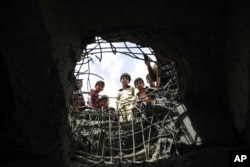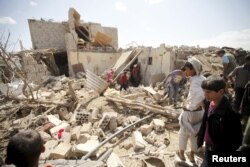Al-Qaida militants in southern Yemen have ambushed and executed at least 15 soldiers after stopping their convoy in the province of Abyan.
Local reports say armed al-Qaida members stopped the soldiers, who were riding in civilian vehicles, in the town of Ahwar. The militants ordered the soldiers to get out of their vehicles and then shot them in the early-morning incident.
Local officials told Reuters news agency that 17 more soldiers were wounded but are believed to be alive, although their location is unclear.
US bombs
On Thursday, Human Rights Watch released a report saying bombs used in a Saudi-led coalition airstrike on a Yemeni market were supplied by the United States. At least 100 people were reported killed in the March 15 attack.
The death toll included 25 children, according to the rights group. Forty-seven people were wounded in the airstrike; the deadliest yet in the year-long war in Yemen.
The release of the report coincided with a visit by U.S. Secretary of State John Kerry to Bahrain. Kerry declined to comment on the situation, saying, “I don’t have any solid information, any documentation with respect to what weapon might have been used.”
Although Saudi officials say the majority of casualties in this strike were Houthi rebels, Human Rights Watch said the attack caused “disproportionate loss of civilian life, in violation of the laws of war.
Such unlawful attacks when carried out deliberately or recklessly are war crimes,” the rights group said.
Other countries supplying weapons
Human Rights Watch has also indicated that if the U.S., Britain and France continue supplying weapons to a non-compliant Saudi Arabia, they may be held responsible as being complicit in the unlawful airstrikes.
Multiple human rights groups have criticized the Saudi-led coalition in Yemen. The United Nations says 60 percent of the 3,200 civilian deaths during this conflict have been the result of airstrikes which have hit markets, clinics and hospitals.
The Iran-backed Houthi rebels seized Yemen’s capital, Sana'a, in September 2014, and the war that followed has left 80 percent of the country in dire need of food, leaving it the poorest nation in the Arab world, according to the U.N.















